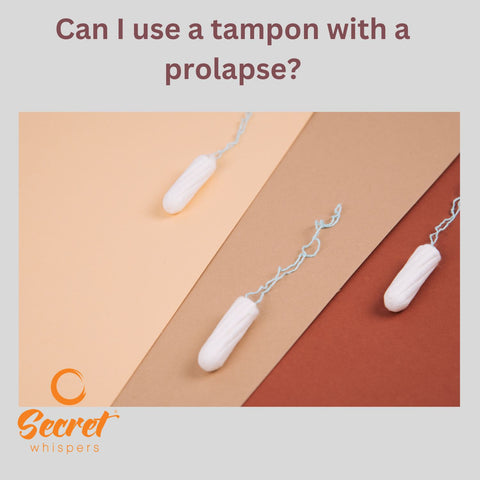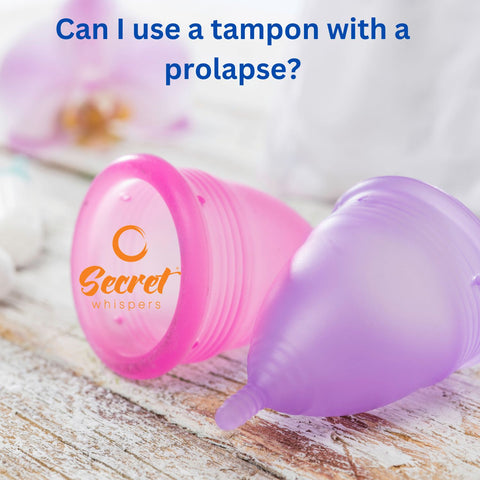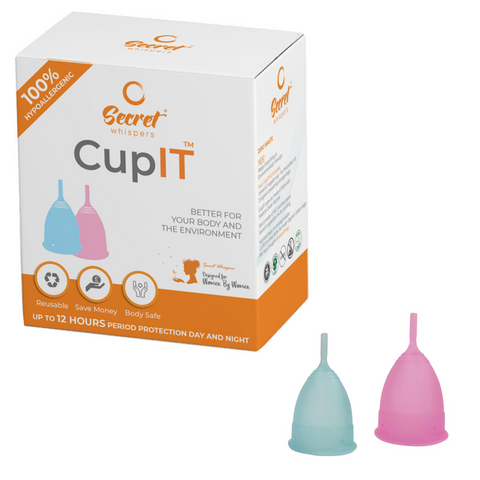Your Period & Pelvic Prolapse - All You Need to Know
Having a pelvic organ prolapse (POP), can be distressing on it's own and then add the addition of monthly periods, many women can feel anxious and stressed that their period products may worsen a prolapse.
So, do period products affect a prolapse? Lets' dive straight in.
In this guide, we have all the answers to how periods and prolapse interact and whether it is safe to use any type of menstration products.
Can a Prolapse Affect Your Period?
Yes, having a prolapse can affect your period, and a period can affect your prolapse, which makes it a disruptive time, and it can become stressful. To minimise the stress, it is important to understand how the two interact and learn the best ways to manage this monthly event.
Depending on how severe the prolapse is, you might find that your monthly bleeding is a little heavier than normal. Minor prolapses will not change the way you bleed, and neither situation should delay a period. If your monthly bleeding gets dramatically worse or disappears altogether, the prolapse is unlikely to be the cause, and you should seek medical advice.
Is a Prolapse Worse When on Period?
Conversely, however, the hormonal changes that come with your period can make a prolapse worse.
During your period, the levels of oestrogen and progesterone in your body fluctuate. Oestrogen surges start the egg release process and, in turn, cause the womb lining to thicken. During this time, you will also experience a strengthening of soft tissues and muscles so that for the first part of your cycle, the pelvic floor can feel a bit better, even slightly stronger.
However, if no fertilisation occurs, progesterone levels go up, oestrogen levels go down, and during the bleeding phase, your muscles become more easily fatigued and weaker. This is can cause the heavy feeling associated with prolapse to become worse and the feeling of everything pulling down to seem more pronounced. This is a normal cycle but can be stressful to deal with.
Can You Use Tampons with a Prolapse?

Whether you can use tampons with a prolapse depends largely on the severity of the prolapse.
Having issues with a tampon staying in place can actually be the first sign of prolapse and prompt women to explore this as a possible problem. The condition can lead to tampons slipping out of place, which makes sense as the strength and tone of the pelvic floor have become weaker. However, there is no medical danger in using tampons with pelvic prolapse.
You just might find it harder to keep in place and may suffer leakages which can be embarrassing. Using tampons that are wider and shorter could be worth trying if you have problems with your normal brand. Some women may change their period protection method or back up tampon use with a towel to ensure that leaks do not become a problem.
Can You Use a Menstrual Cup with a Prolapse?

Yes, you can use a menstrual cup with a prolapse. It is often mistakenly labelled a problem, but actually, it is perfectly safe. The menstrual cup works by creating a seal using suction, but if you take care to break the seal before trying to remove the cup, it should not present an issue.
Because they have a wider top section when compared to a tampon, many women feel they provide a more secure fit when there is a pelvic prolapse.
Can Menstrual Cup Cause Prolapse?

No, a menstrual cup shouldn’t cause a prolapse or make a prolapse worse. Again it all comes down to the way it is handled. Many women who have pelvic prolapse and prefer the menstrual cup choose to have the widest and shortest cup they can. They also trim the stem to ensure they have to grasp the bottom of the cup to break the seal before removal.
How to Manage Your Period with a Prolapse
The most important thing to managing your period with prolapse is understanding the process. As mentioned, there are changes in hormone levels which can make the prolapse seem a lot worse. It can be a stressful time for women, but with the right education, things can become more positive.
You may find that your previously perfect period protection no longer offers you the same security, so it is possible you need to experiment with new options.
Tampons can potentially slip out of place or leak, and this is distressing. Period underwear is also a modern and discreet option, and you might want to try a menstrual cup if you haven’t already. Menstruation towels are also an option to ensure that you feel confident all day. (Just be vigilant that they don't contain any toxic chemicals).
Kegel exercises are still one of the best ways to help with prolapse and should be continued regularly. It is perfectly safe to do Kegel exercises even when you are actively bleeding. You can even use our Pelvic Floor Trainer Weights when on your period - completely up to personal preference. Many women do not like to stop using their weights on their period. We just recommend, using a pad and remove your weights in the shower.
In fact, the more often you can exercise, the stronger your pelvic floor should become.
In Conclusion
Having a pelvic prolapse should not impact too much on your normal monthly cycle, but you may need to reevaluate your choice of period product if you have previously relied on tampons. If they continue to work for you, there is no problem in using them but for some women, pelvic prolapse can mean tampons do not fit as well as they used to.
There is no reason for prolapse to make your bleeding any worse or delay your period, so if this is happening, you should investigate the cause with your primary care provider. However, the hormone fluctuation related to the cycle can make the prolapse feel worse during active bleeding, and this is normal.
Would You Like To Try Our Menstruation Cup Pack For Just £19.99 Today? Half price...
Now is the time to make the change. At checkout the discount applies automatically.
2 Cups for you to choose from and only need to be changed EVERY 12 HOURS!
--------------------------
Don't forget that the next 30 Day Pelvic Floor Challenge in March 2023 starts on the 20th March. Get signed up now so you don't miss out.
Never miss another blog again. Sign up now to my weekly Newsletter. You will get a 10% discount code to use too.Just click below ⬇️⬇️⬇️













